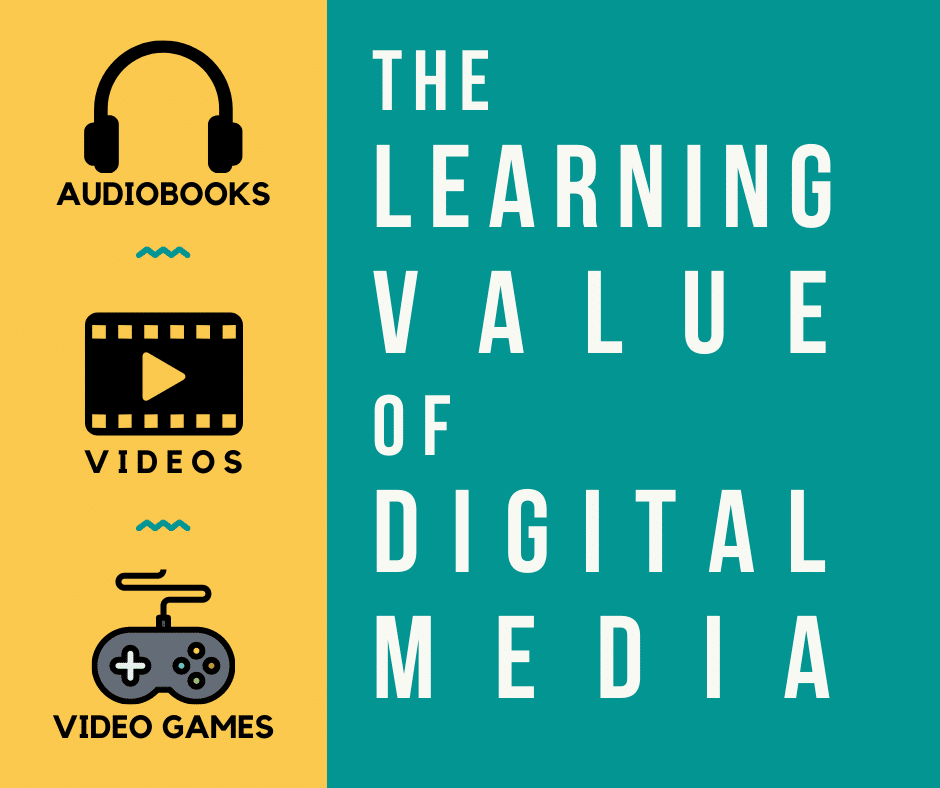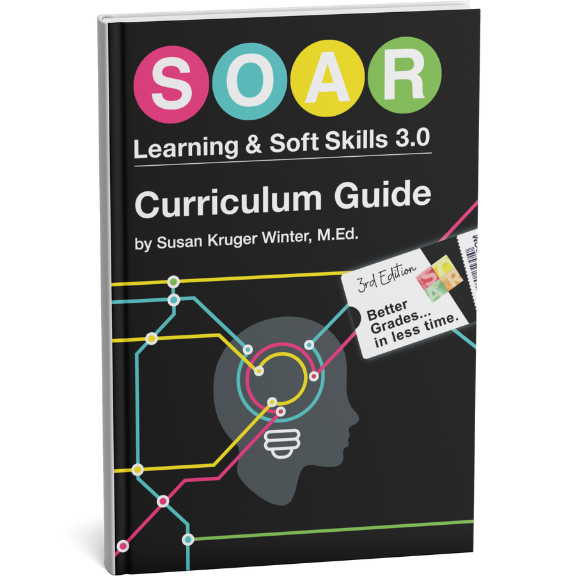The Learning Value of Digital Media: Audiobooks, Videos, & Video Games
The following article was first published in 2021, during the thick of the pandemic. We wanted to share this article again because the learning value of digital media still remains true to this day!
We are both educators, but you can stick a fork in us… we’re DONE! We’ve always said that we could never “homeschool” our own children. Having to do it in global shut-down, while managing growing demands of our “day job,” is simply too much!
So, we’ve scaled back. Waaaaaay back. All those social media memes… Yup, that’s us! I know (from the plethora of memes) that’s you, too! Which is why I thought it would be good to take a look at the merits of some digital materials.
I imagine efforts to save your sanity have already led you to lean on self-directed media for your children and young adults. Now, see why you should NOT feel guilty about that…
Audiobooks for All Ages
Audiobooks are one of the most powerful learning tools available and Audible is making thousands of titles available for free!
Initially, I discovered the power of audiobooks by sheer accident. I was a young 3rd-grade teacher with a completely illiterate child in my class; she could not identify the beginning or end of an individual word in a sentence. She did not qualify for special education services because, at the time, eligibility was based on her IQ; it was very low and the school claimed her performance matched her ability, so there was nothing more they could do. (Grrr!)
Serendipitously, at the same time, I was asked to pilot a reading curriculum that came with reading texts, books/novels… and “books on tape.” Every week, the class read a shared “read-aloud” before students split into small, “leveled,” reading groups with a variety of additional literature. The read-aloud story established a group theme and allowed for whole-group instruction on various topics. However, even the lowest-level books for reading groups were not accessible to this sweet student.
With no other clue how to help her, I set her up at the listening station. Every Friday, she listened to the whole-class read-aloud scheduled for the following Monday. At her choice, she would listen multiple times. For the following week, she was able to participate in the whole-group comprehension, vocabulary, decoding, and word analysis lessons that all branched from the class’s shared text. She never volunteered, but she was eagerly engaged!
The listening center was open for her to use, at any time. And, she used it EVERY day. She loved the autonomy of choosing when and what to listen to. Usually, she chose the current week’s story at least a dozen times. Sometimes, she went back to old favorites. I figured she must have been getting value from it! Besides, at the time, I didn’t know how else to help her.
Little-by-little, her independence grew. By second semester, she was occasionally willing to raise her hand to volunteer. When invited, she eagerly joined a reading group. We did not get audio versions of the leveled readers, but she was getting stronger at following along when her peers read.
One amazing day, she read a full passage on her own; her group cheered in support like she won an Olympic medal! By the end of 3rd-grade, she went from not even placing on my lowest-level reading score… to “middle 2nd-grade!”
The only “special” intervention was the audiobooks!1
Outcomes may vary for different students, in different settings, but this story illustrates how much benefit audiobooks can provide! Over time and additional study, I’ve come to understand why audiobooks are so powerful:
- Audiobooks take the pressure off “decoding,” allowing the reader to focus on comprehension, while also absorbing the syntax, cadence, and new vocabulary. (“Mature readers” rely on these elements to do most of the heavy-lifting for reading comprehension, anyhow.) Audiobooks bypass potential delays caused by “decoding,” while allowing the other cognitive skills to stretch their legs.
- Audiobooks provide a “friction-free” reading experience. Assuming the content is of interest to the student and the vocabulary is not advanced for the reader’s preexisting knowledge, listening to an audiobook “feels” like less work, so it allows the reader to relax-while-learning. This causes some people to assume reading-by-audiobook is “cheating”; however, in reality, audiobooks allow the front brain to relax while the back brain –the areas of higher-level processing– are activated.
- Students can progress at their own pace. If they missed something, they can rewind. If they had an epiphany, they can pause. If their attention is drifting, they can speed up the rate-of-reading to better match their rate-of-attention. (1.25-1.5 is usually most ideal for “familiar” text. But, students will easily figure this out for themselves.)
- Students can “repeat” readings. We’ve all seen children latch on to a book that they read and reread until the pages wear thin. Do NOT discourage this. As long as they are choosing to reread something, they are getting value from it. When the value has been exhausted, they will get bored and move on. We must assume that every repeated reading is forging deeper, meaningful growth. Audiobooks allow this to happen.
- Students can progress without someone over their shoulder. Have you ever noticed how your typing accuracy goes to pot when someone is looking over your shoulder? Likewise, growing readers can benefit from the solo time provided by an audiobook.
Students of all ages (including adults) benefit from audiobooks. I recommend using them anytime they are available. They only strengthen the reader!
A Few Notes About Audiobooks…
Students get maximum benefit from reading text, along with audio narration. However, there is still great value in audio only.
Digital narration, provided by some accessibility services such as Bookshare.org, are phenomenal resources for bridging accessibility gaps. However, they do not provide many of the reading benefits listed above because the computer eliminates all proper “cadence” of speech, which eliminates, or greatly reduces, many other skill-building benefits.
Videos
Visual literacy deserves our respect and attention. Video is a prominent learning medium that is here to stay.
“Watching videos” may seem like a passive activity… But, the process becomes quite “active” when students have the freedom to make choices and follow their own “rabbit holes!”
Both of our children have learned information and skills that far exceed our knowledge/abilities in certain areas! My 11 yr-old has learned how to do every type of art and craft… endless arts and crafts! Our 16-yr-old has been particularly handy. He used a couple YouTube videos to patch some drywall for us, repaired a light switch (with supervision and proper precautions), and repaired some body damage on one of our vehicles. He’s used videos to teach himself how to use several Adobe design tools to create and edit videos for himself and for SOAR.
Of course, you must take safety precautions to your availability and preference. Coach your children and young adults about internet safety and appropriate-vs-inappropriate content. If you remain concerned about exposure, help them develop playlists on topics of their choice.
Video Games
Ahhh… I saved the most controversial for last. First and foremost, as noted above, internet safety is of supreme importance!
Outside of safety concerns, however, video games get a completely unfair rap! The popular perception is that video games are melting our children’s brains.
Yet, the truth is that no other resource can match the cognitive complexity inspired by video games!
Our son got into video games at a very young age. His 20-year-old cousin moved in with us; our son was ecstatic to have a “big brother,” but finding common ground between an 8-yr-old and a 20-yr-old was tricky! Video games became one of the only viable options. Eventually, “Big Brother” taught him how to play guitar, but I am confident that would not have happened without the bonding via video-games.
That illustrates the first benefit of video games… Social bonding. Ironically.
Additional benefits of playing video games include:
- Providing immediate feedback! This is the single reason video games are so popular. It’s also the reason they are so powerful; immediate feedback is the most critical part of any learning process.
- Developing software-management skills, often for very complex software. I see my kids navigating programs that remind me of the feel/function of Adobe design products. If you happen to be familiar with how powerful-yet-NOT-user-friendly Adobe design software is, you know that this is an employability-skill in the making!
- Developing advanced design skills! Video games are complex creativity tools; I see my kids designing elaborate worlds, maps, buildings, characters, etc. Then, they get to interact with/in these creations! It’s truly amazing. (I’m honestly jealous of what they can do.)
- Building, budgeting, and prioritizing skills. Every game has some form of currency that works like any trade system; earn, save, spend carefully… I can’t tell you how many times we’ve attempted to explain some sort of budgeting or prioritizing decision to our kids and they reply with some form of, “Oh, well, that’s just like how I got blah-blah-blah in such-and-such game…” They don’t just “get” the lessons we are trying to teach, they get the decision-making and prioritizing on an intrinsic, visceral level!
- Developing collaboration skills. More than ever before, this pandemic has prompted my kids to play more video games with their friends. I hear them navigating collaboration and compromise in the process. (Safety note: our kids are only allowed to play with people they’ve met face-to-face).
- Developing wicked visual-spatial and fine-motor skills! These skills are already considered advanced-level, “in-demand,” employability skills!
Play on, my children!
To be clear, under non-pandemic situations, we also encourage a healthy balance of active, in-person activities. But, we also see video games as an unmatched edu-tainment tool!
“Everything Bad Is Good for You”
Finally, if you’re concerned that video games might melt your kid’s brain, I highly recommend this book: Everything Bad Is Good for You. The author walks through a variety of additional illustrations and statistics regarding the compelling benefits of advanced technologies, especially video games.
Conclusion
Above all else, your family’s sanity is the most important priority of navigating this shutdown! That starts with putting on your own oxygen mask, first. If that means you’re relying on digital more than you had hoped, or that you simply lost steam trying to keep up with managing digital time-limits because -let’s face it- the alternative is that you become the entertainment, then hopefully this information has provided you with some reassurance that there’s solid value in all of it.
To our students’ success… and our sanity,
Susan Kruger Winter, M.Ed.
(with Brian Winter, M.Ed.)
1This story may seem like I am endorsing “exclusive” use of audiobooks, which may trigger a flag for some teachers. Please note, since the time that story took place, I’ve received a grad-degree in reading and acquired 20+ years of experience. Today, I better understand how to provide explicit instruction in all cueing systems: visual, syntax, and meaning, as I explain in-depth in my Cue to Reading Series. However, all of that idealism is assuming teachers are teaching in a classroom. When dealing with pandemic-induced shutdowns, audiobooks are a wonderful way to fill some gaps until school resumes. 🙂
Six Steps
Conquer the Chaos
Get Our Free Guide & Information on...

"*" indicates required fields
Get Our FREE Curriculum Guide!
The SOAR® Curriculum
The most critical learning, organizing, and communication skills needed for school. Learn more here.
Who’s Using SOAR®?
SOAR® Guarantee
Click here to learn more.






